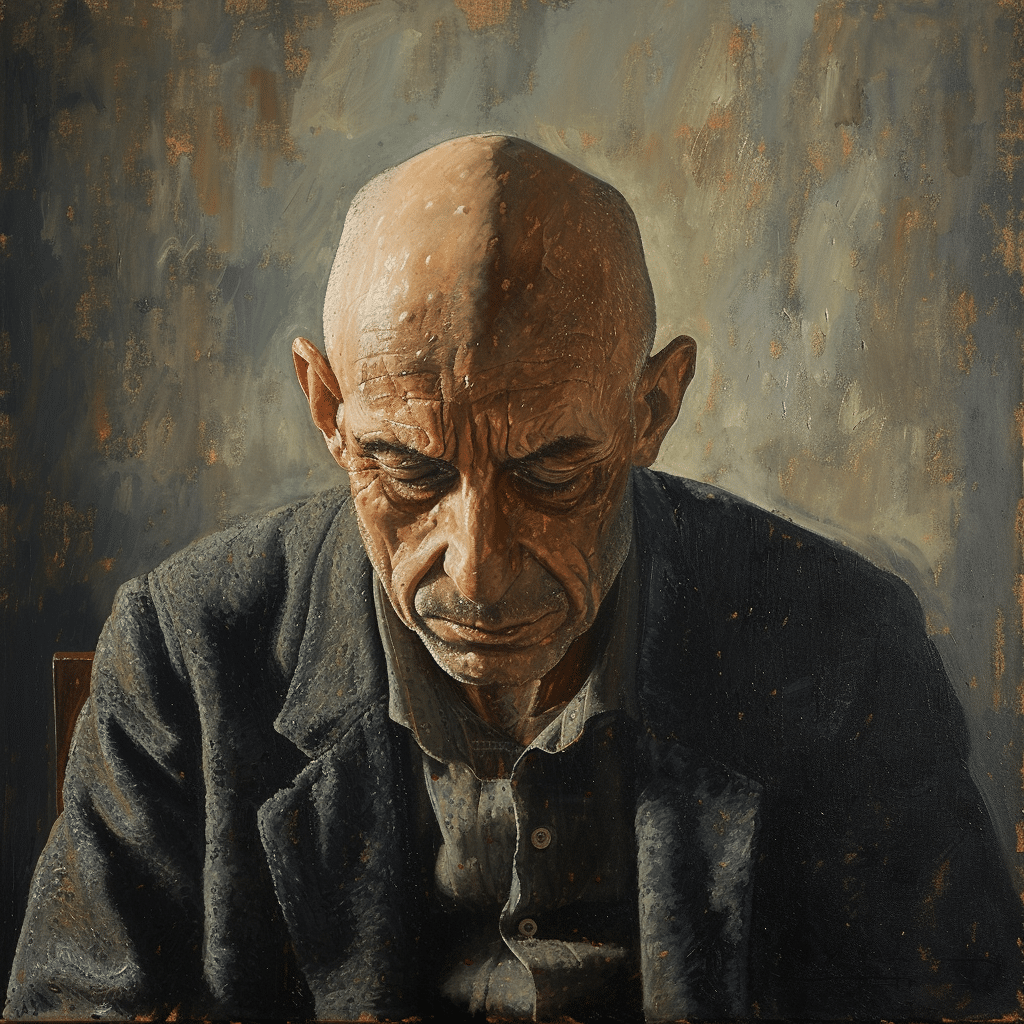Lewis Strauss is not a household name bobbing around in our daily latte conversations, but c’mon, fellas, this chap’s saga is one heck of a thrilling tale that’s woven into the very fabric of those unseen tantrums that global powers like to throw – we’re talking atomic-scale fits, where the stakes are as high as your ambitions on a Friday night.
The Rise of Lewis Strauss: A Nuclear Visionary
Strauss was quite the feather-ruffler in his time. Skipping college to peddle shoes, he climbed up the ladder not just any run-of-the-mill ladder, but the kind of cutthroat Wall Street ladder that could make even a slick-haired stockbroker sweat.
Now, here’s where things get spicy. Cue his meteoric rise to becoming a key atomic-energy influencer during the swanky days of the Cold War. But hang on – Lewis wasn’t just any suit in the crowd, he was that guy in the smoky room pulling the strings, especially entwined in the spectacular fall from grace of J. Robert Oppenheimer, the brainiac behind the A-bomb.
Alright, so let’s break it down, here’s the gist of Lewis’s show:
Lewis’s initial leg-up in atomic policy wasn’t just him being at the right cocktail party. The dude had a sixth sense for nuclear matters that made him the go-to for anything atom-related.

Navigating Atomic Power: Strauss’s Stewardship in the AEC
Strauss knew how to play ball as chairman of the AEC. Just like choosing the perfect travel wallet for a globe-trotting escapade, he knew the ambition-filled potential of atomic power, nudging it from sketchy bomb-maker to the more charming Belle of the Ball – civilian energy source.
His escapades in the commission played out like a high-stakes poker game:
Lewis’s vision had those electrons dancing to a new tune, one that powered cities and chilled champagne in penthouses (metaphorically speaking… or not).
| Category | Details |
|---|---|
| Full Name | Lewis Lichtenstein Strauss |
| Date of Birth | January 31, 1896 |
| Date of Death | January 21, 1974 |
| Profession | Financier, Public Official |
| Key Positions Held | Chairman of the United States Atomic Energy Commission (AEC), 1953-1958 |
| Educational Background | Did not attend college; started career in shoe sales |
| Key Controversy | Role in the downfall of J. Robert Oppenheimer |
| Conflict with Oppenheimer | Accused Oppenheimer of disloyalty, leading to revocation of Oppenheimer’s security clearance in 1954 |
| Methods Used Against Oppenheimer | Surveillance with the assistance of FBI Director J. Edgar Hoover; included illegal wiretapping |
| Outcome for Oppenheimer | Security clearance revoked; faced Senate panel and found “loyal but risky due to communist associations” |
| Oppenheimer’s Date of Death | February 18, 1967 |
| Age at Death | Strauss: 77, Oppenheimer: 62 |
| Cause of Death | Strauss: Lymphosarcoma |
| Key Achievements | Pioneered a major atomic energy policy during the Cold War |
| Failed Nomination | Rejected by the Senate for U.S. Secretary of Commerce (circa 1959) |
| Legacy | Remembered for influential role in atomic energy development and espionage accusations against Oppenheimer |
Cold War Tensions and the Strategic Mindset of Lewis Strauss
Cue the James Bond music, ’cause now we’re delving into the cloak-and-dagger biz. Cold War jitters meant that every atomic tic was scrutinized, and Strauss was playing 4D chess with the Soviets.
Our lad Lewis, the Icarus of atomic diplomacy, navigated through a Byzantine chessboard, where each pawn was a nuke and each checkmate a potential Armageddon.
Here’s how he rolled:

Behind the Power: Lewis Strauss’s Rivalries and Alliances
The plot thickens as Strauss didn’t just play with atomic fire – he also played with ivory-tower egos and Capitol Hill ambitions. Politics, backstabbing, alliances – it’s basically “Game of Thrones,” but replace swords with uranium rods and dragons with Red Scare hearings.
Let’s unravel some of those twists:
He made sure his game of chess didn’t just have pawns but knights in shining armor and at least one queen that packed a wallop.
The Controversial Legacy of Lewis Strauss in Atomic Policy
Take a step back, gents, ’cause Lewis’s tales are not purely for the ballad writers. His legacy? More tangled than your earphones after an intense gym session. There’s an epic narrative of innovation and ambition, peppered with enough drama to make a soap opera blush.
The legacy low-down:
Controversial? Sure. Captivating? You betcha. But Lewis’s saga isn’t just set to old-timey tunes on a crackling radio – it’s a living, breathing opera echoing through modern corridors of power.
Lewis Strauss and the Nuclear Age: Echoes in Contemporary Issues
Spin it forward to today, and Strauss’s radioactive fingerprints are all over our times. Atomic power, non-proliferation, energy debates – it’s like Lewis’s mixtape got stuck on repeat.
Here’s the bomb-diggity of our times:
Innovating Beyond Strauss: The Future of Nuclear Power and Diplomacy
Sip on this – the atomic highball Strauss concocted is getting a modern remix. Today’s quantum jockeys are sifting through his playbook, cherry-picking the best moves while sidestepping the booby traps.
Predictions and postulations:
Lewis might have left the ballroom, but his music still bumps in the club of nuclear policymaking.
Conclusion: Reassessing Strauss – The Complex Tapestry of Atomic Power and Rivalry
Whew, alright boys, time to land this jet. Lewis Strauss – the man, the myth, the atomic maverick – penned a tale of power, vision, and good ol’ human rivalry that’s more captivating than the latest blockbuster.
His story ain’t just a lesson in history; it’s a chapter from the book of “How to Hustle and Influence People (While Keeping One Finger on the Atomic Button).” Strauss’s legacy is a swanky affair with ambition, a fable of power – both the nuclear and political kinds – and a cheeky wink at what happens when a man gambles with humanity’s most volatile stakes.
So, put on your best suit, pour yourself a stiff one, and tip your hat to Lewis Strauss – a man who played atomic dress-up with the world and left a saga that still thrills. And remember, fellas, in the ever-slick world of power, it’s all about how boldly you play the game. Cheers!
Unearthing the Atomic Narrative: The Lewis Strauss Saga
Lewis Strauss stands as a polarizing figure in the atomic age, etching his name into the scrolls of history with actions and decisions that still spark debates today. Now, buckle up, ’cause we’re about to dive into some lesser-known, downright fascinating tidbits about the man, the era, and the atomic anecdotes that you might not have heard before.
The Rise of an Atomic Powerhouse
Lewis Strauss wasn’t just any bureaucrat. Nope, he climbed the ladder with the grace of a cat burglar, reaching the upper echelons of atomic energy fame. Think of him as the atomic era’s answer to Carmen Jones—just as charismatic but swap out the song and dance for uranium and policy. His influence soared, and with each decision, he played a complex symphony of power, shaping the future of nuclear energy. For a guy in his position, pulling the strings from behind the curtain was akin to steering the course of the river itself.
Rivalries That Sizzled Hotter Than Fission
Oh boy, did the air sizzle around Lewis Strauss and his contemporaries. Tensions among top brass in the atomic circles could give even the most heated Hollywood feuds a run for their money. Imagine the clash of titans, it was like Ione Skye stepping into the ring with the heavyweights of her time—drama, intrigue, and high stakes!
These weren’t just any rivalries; they shaped policies and lives, as Strauss and his adversaries locked horns. Sometimes, these atomic power struggles were less about the science and more about the size of the egos involved. These were the days when politics were as charged as a particle accelerator, and Lewis Strauss was right in the thick of it.
The Fallout: Legacy or Infamy?
It’s a real head-scratcher—sorting out Lewis Strauss’ legacy. His impact was like a high-energy particle collision, leaving a maze of outcomes that both baffled and bedazzled observers. Just when you think you’ve got him pegged, surprise, surprise, there’s another layer to uncover.
The enigma of Strauss lingers, much like the internet mysteries of our time. Speaking of which, remember the hubbub around whether Lil Tay is truly dead or not? Rumors swirled, leaving folks scratching their heads. Was it all just talk, or was there truth to the whispers? Just like digging into the controversy surrounding Lewis Strauss, sometimes the journey to the truth takes you down a bunch of winding, unexpected paths.
The Echoes of Strauss’ Time
Let’s get real for a sec—deciphering the atomic age is as complex as trying to understand the nuances of the Daniel holtzclaw case. Just when you think you’ve nailed the facts, another layer of the story unfolds. Lewis Strauss was smack dab in the middle of this intricate dance.
His story reminds us that history is often as tangled as a bowl of spaghetti, and trying to pick apart the strands can leave you with more sauce on your face than clarity. But that’s just the thing—despite the mess, it’s the juicy bits of history that keep us coming back for more, licking our fingers and eager to discover what’s hidden beneath the sauce.
Atomic Power and Rivalries: The Afterglow
Now, as we look back on the atomic shenanigans of Lewis Strauss’ day, we can’t help but marvel at the legacy. It’s like peering through a kaleidoscope of history, where every twist reveals a new pattern of power plays, personal vendettas, and the daunting realities of the atomic era.
In the end, examining the life and times of a figure like Lewis Strauss isn’t just about recounting facts; it’s about delving into the heart of human ambition, rivalry, and the relentless quest for power. And just like the aftermath of a good drama, we’re left to ponder the residues of his actions, eternally speculating on their ripples through time. Who knew history could be as gripping as the latest plot twist in your favorite TV show, huh?
Alright, folks, that’s a wrap on our stroll down atomic lane with Lewis Strauss. Whether you’re left in awe or scratching your head, one thing’s for sure: the atomic realm, with all its peculiarities and rivalries, is as fascinating as it is formidable. And if you’ve hung on till now, hats off to you—you’ve just powered through a nuclear fusion of history and trivia that’ll make for some top-notch dinner table talk. Just remember, when it comes to history, the truth is often stranger than fiction!

What did Lewis Strauss do to Oppenheimer?
– Alrighty, let’s dive in with Lewis Strauss, shall we? He was like a hawk with Oppenheimer, keeping a watchful eye on him from his AEC chairman perch. Yup, you guessed it, during the 1950s, Strauss turned to the top dog at the FBI, none other than J. Edgar Hoover, to shadow Oppenheimer’s every move. They were searching high and low for signs of disloyalty, even resorting to illegal phone taps. Talk about holding a grudge!
Why did Strauss set up Oppenheimer?
– Talk about a bitter pill to swallow! Lewis Strauss had it in for Oppenheimer because, well, Strauss was convinced that Oppy was too chummy with the red crowd. During the paranoia-packed Red Scare, Strauss played his hand by casting doubt on Oppenheimer’s loyalty, ultimately kicking the physicist off his security clearance pedestal. It’s the old “guilty by association” spiel!
What happened to Lewis Strauss?
– Oh, Lewis Strauss? His story’s a bit of a roller coaster. After his stint pulling atomic strings and stirring up controversies, he wanted to be the U.S. Secretary of Commerce. But the Senate was like, “Thanks, but no thanks,” and hisappointment was a no-go. About 15 years later, Strauss met his match with a tough customer named lymphosarcoma, which he battled for three years before passing away in 1974.
What was Lewis Strauss famous for?
– Well, Lewis Strauss was the finance guy who shunned college for shoe sales, but then shot up the ladder to become America’s atomic ace during the Cold War. But wait, there’s more! He’s infamously remembered for playing a lead role in the downfall of J. Robert Oppenheimer, the big brain behind the A-bomb. Talk about leaving a mark!
Why did Teller betray Oppenheimer?
– Oh, the Teller tale is a real backstabber! Edward Teller, another big-brain physicist, threw Oppenheimer under the bus during those hair-trigger times of the Red Scare. Despite being colleagues, Teller went all Judas at Oppenheimer’s security hearing, doubting his buddy’s loyalty to Uncle Sam. That’s one way to burn bridges and light a match to a friend’s reputation!
What did Einstein say to Oppenheimer?
– Einstein and Oppenheimer, those were two peas in a brainy pod. But when push came to shove, Einstein stood by his fellow thinker. He reportedly said to Oppenheimer, “I really have no right to address you in such a fashion, but I cannot refrain from saying that I see the misfortune that has struck you as a national calamity.” Einstein knew the score—losing Oppenheimer was like dropping the ball big time.
Did Strauss betray Oppenheimer?
– Did Strauss betray Oppenheimer? Well, if you call tracking someone’s every move, tapping their phones, and pushing for their security clearance to be yanked a betrayal, then yeah, Strauss basically stabbed Oppenheimer in the back. It’s the classic frenemy scenario sprinkled with Cold War paranoia.
What WTF is Oppenheimer about?
– So, “WTF is Oppenheimer about?” That’s the million-dollar question, isn’t it? Oppenheimer is the story of a genius caught in a web of atomic politics and Cold War suspicions. We’re talking about the father of the atomic bomb, a man entangled in a mess of accusations, loyalty questions, and the fickle fate of being a hero one minute and an outcast the next. Quite the rollercoaster, huh?
How old was Oppenheimer when he died?
– J. Robert Oppenheimer clocked out at the age of 62—a bit of a curtain call for the theoretical physicist and “Father of the Atomic Bomb.” Born in 1904, he said his final goodbye in 1967, leaving behind a legacy that’s both impressive and controversial.
Did Oppenheimer know Einstein?
– Did Oppenheimer rub shoulders with Einstein? You bet he did! These two geniuses were members of the smarty-pants club, often crossing paths in the world of physics. They might not have been BFFs, but you can bet your bottom dollar they knew each other and respected each other’s gray matter.
What was Lewis Strauss accused of?
– Lewis Strauss accused? Oh boy, the irony! The guy who was keen on sniffing out disloyalty in others found himself in the hot seat when whispers started suggesting he exaggerated his claims during his nomination for Commerce Secretary. Senate said, “No Commerce for you!” and his rep took a hit. Talk about getting a taste of his own medicine!
What happened to Oppenheimer’s children?
– Touching on Oppenheimer’s kiddos, well, they’ve managed to keep a pretty low profile, steering clear of their dad’s atomic-sized controversies. The whole affair with the security clearance and Red Scare drama left a bit of a shadow, but they’ve done their best to steer clear of the fallout.
Who was Oppenheimer’s nemesis?
– J. Robert Oppenheimer’s nemesis? That role goes to none other than Lewis Strauss. Like a cat and mouse game, Strauss prowled around, aiming to nip Oppenheimer’s rep in the bud over alleged Red ties. Let’s just say their chemistry was more explosive than synergistic.
How historically accurate is Oppenheimer?
– Peeking at the historical lens on Oppenheimer, and it’s clear the dude’s life has been dramatized more times than a soap opera. While much is accurate—like his fall from grace during the Red Scare—Hollywood loves to add extra spice for that cinematic punch. So, grain of salt, folks—always check the facts!
Who is the villain in Oppenheimer?
– The villain in the Oppenheimer narrative? It’s got to be Lewis Strauss. When it comes to dishing out drama and lighting the fuse on Oppenheimer’s downfall, Strauss played that part to a T. He’s the one that had the audience hissing and booing in this scientific soap opera.






















